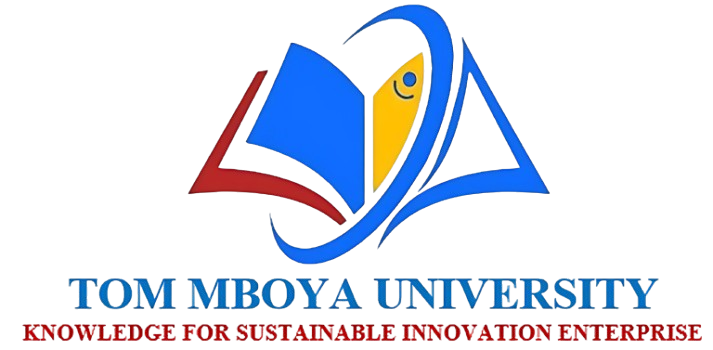Library
February 1, 2021 2024-11-24 13:57Library
Vision & Mission
Guiding Principles of Our Library Services
Our Vision
To be the premier academic hub for information provision, knowledge dissemination, and cultural preservation.
Our Mission
To deliver exceptional information services that empower teaching, learning, and research excellence.
Core Aspects
Essential Components of Our Library Services
Library Staff
- In Charge Library Section: Charles Obat
- Email: cobat@tmu.ac.ke
- Head – User Services
- Head – Library ICT Section
- Head – Technical Services Section
Opening Hours
Our library is open to serve you during the following hours:
- Monday – Thursday: 8:00 a.m – 8:00 p.m
- Friday: 8:00 a.m – 5:00 p.m
- Saturday: 9:00 a.m – 4:00 p.m
- Sunday & Holidays: Closed
* Extended hours during examination periods
TOM MBOYA UNIVERSITY LIBRARY LENDING POLICY
| Category of users | Short Loan | Long Loan | |||
|---|---|---|---|---|---|
| No. of items | Duration | No. of items | Duration | ||
| 1 | Teaching staff | 1 | 7 days | 5 | 30 Days |
| 2 | Non-Teaching staff | 1 | 1 day | 2 | 14 days |
| 3 | Undergraduates/diploma/certificate | 1 | 1 day | 4 | 14 days |
| 4 | Postgraduate | 1 | 7 days | 5 | 30 days |
| 5 | ODEL students | 1 | 7 days | 5 | 30 days |
| 6 | Management & Council members | 1 | 7 days | 5 | 30 days |
RULES ON THE USE OF THE DIGITAL LIBRARY
CLEARANCE
- All users are required to clear from the library before leaving the University.
- All borrowed books should be returned before the user is finally cleared
LIABILITY
Users are required to ensure that valuable items (such as money, laptops, phones etc) are not left at the baggage area. The library will not be held responsible for loss of any property left unattended in the library by users.
RULES ON THE USE OF THE DIGITAL LIBRARY
- The following will constitute unacceptable use of computers and the internet.
- Booking or reserving PC machines shall not be allowed
- Users are not allowed to transmit or receive any material that infringes copyright, contains obscene material, pornographic material or protected material.
LIBRARY SECTIONS
- Technical Processing Section - where all documents are acquired and processed
- Circulation Section - For issuing and returning documents.
- Periodical Section - Journals, magazines, newspapers
- Reference Section - Reference materials including encyclopedias, dictionaries, handbooks, etc.
- Stack Section - Main book collection
- Study Room Section - Quiet study spaces
- IT Section - Computer workstations and e-resources
- Back Volume Sections - Archives of periodicals
- Special Collection Section - Unique collections
- Braille sections - Resources for visually impaired users
LIBRARY SERVICES
Lending Regulations and Penalties
- Only registered students and staff are entitled to borrow materials
- Valid Student/Staff ID must be presented for borrowing
- Lost or damaged materials must be replaced at market cost plus KSh. 500 processing fee
- Overdue regular loans: KSh. 5 per day
- Overdue short loans: Ksh. 2 per hour
Fines and Penalties for Library Offences
| No. | Offence | Fine/Penalty |
|---|---|---|
| 1 | Delays with long loan library book(s) | KSh. 5 per day; borrowing privileges suspended |
| 2 | Delays with short loan library book(s) | KSh. 2 per hour; borrowing privileges suspended |
| 3 | Theft or attempted theft of library items | Twice replacement cost + KSh.500 fee + possible suspension |
| 4 | Defacing or damaging library materials | Replacement cost + KSh.500 fee + possible suspension |
| 5 | Using library card under false pretenses | Suspension up to one semester |
INFORMATION LITERACY
Tom Mboya University College conducts training sessions in Information Literacy Skills for its users. These sessions cover:
- Critical engagement with digital information
- Effective information discovery and evaluation
- Ethical use of information
- Professional communication in academic work
- Assessing credibility and authority of sources
Regular workshops are scheduled throughout the academic year.
RESEARCH TOOLS
Essential tools for conducting academic research:
REF-N-WRITE Academic Writing Tool
A Microsoft Word add-in that helps with academic writing by providing phrase suggestions and templates.
Statistical Analysis Tools
Reference Management
Plagiarism Checkers
SUBSCRIBED ERESOURCES FOR 2024
Access to Information
Bridging knowledge seekers with academic resources
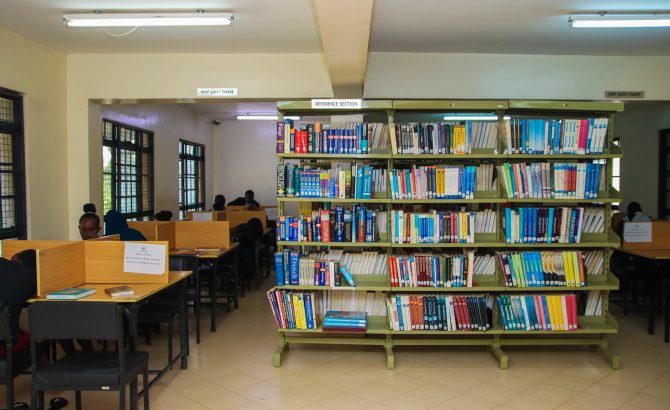
Students accessing physical and digital resources at the TMU Library
What We Offer
The library provides access to a comprehensive collection of academic resources including books, journals, theses, e-resources, and newspapers. We maintain up-to-date, well-organized collections in both physical and digital formats to support the entire academic community.
- Extensive print and digital collections
- Current periodicals and newspapers
- Specialized academic databases
- Open-access institutional repository
Support for Learning & Research
Empowering academic success through expert guidance
Academic & Research Assistance
Our dedicated library staff provides comprehensive support for all research needs. From initial literature searches to final citations, we offer personalized assistance to help students and researchers achieve their academic goals.
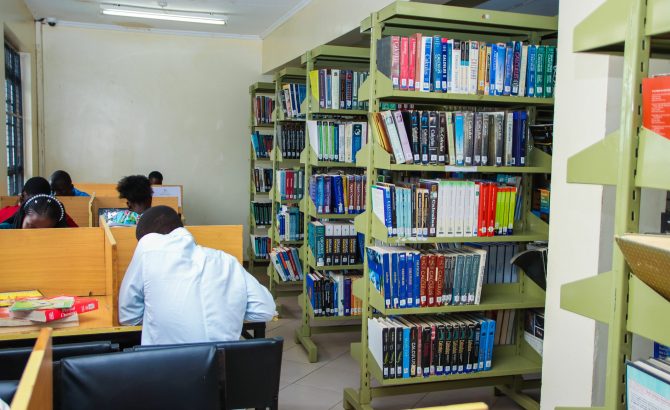
Research support through one-on-one sessions and resource discovery tools
Information Literacy Training
Developing essential research skills for academic success
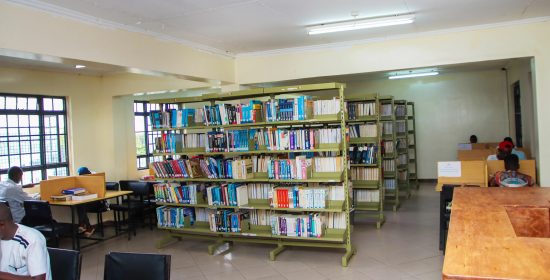
Skill Building Sessions
Our information literacy program equips students with critical research skills through workshops and orientations. Participants learn to effectively search, evaluate, and ethically use academic information.
Workshop Topics Include:
- Advanced database searching
- Evaluating information sources
- Academic citation styles
- Plagiarism prevention
Schedule:
Monthly sessions scheduled throughout the academic year. Custom workshops available for classes and research groups.
View workshop calendar →Preservation and Archiving
Safeguarding knowledge for future generations
Maintaining Academic Records
Our preservation initiatives ensure long-term access to valuable academic works. We archive institutional publications, theses, and rare materials in both traditional and digital formats.
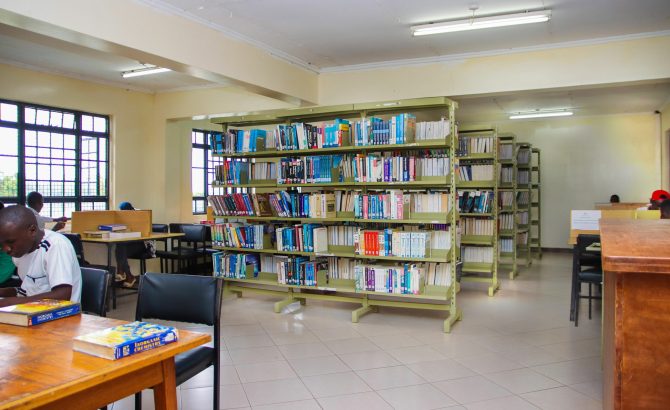
Staff scanning and cataloging rare documents in the digitization section
Reading Culture & Community Engagement
Fostering a vibrant literary community

Engaging Beyond Books
We cultivate a dynamic reading culture through diverse programs that connect the university community with literature and ideas.
Literary Events
- Author talks and book signings
- Student poetry slams
- Reading challenges
Community Programs
- Book discussion groups
- Annual book fair
- Children's story hours
Library Catalog Search
Search Results
Contact the Library Department
Email: library@tmu.ac.ke
Location: Tom Mboya University Main Campus

